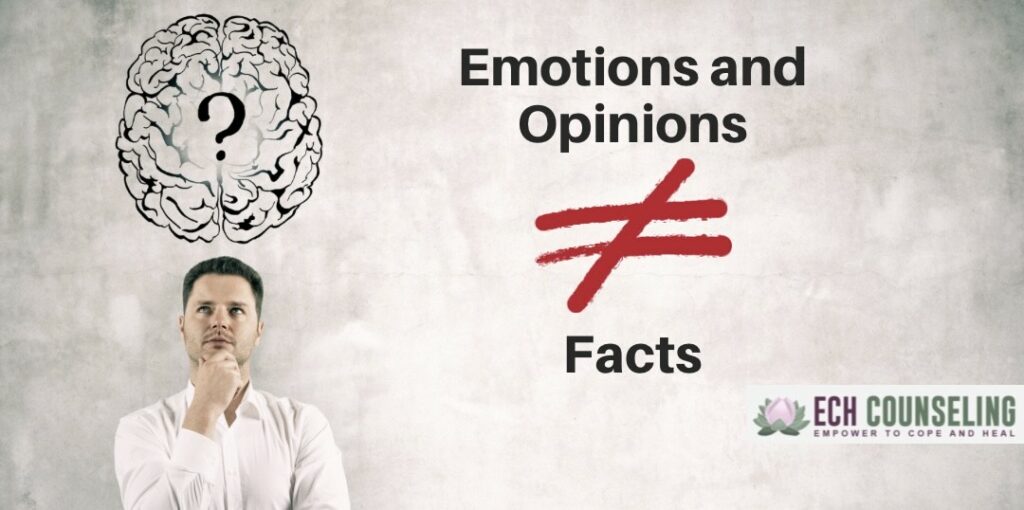
Written by Jennifer Cox LCPC
Emotions and opinions are an integral part of our experiences – They shape our perspectives guide our actions, and give meaning to our interactions. However, it is important to remember that emotions and opinions are not facts.
Emotions are subjective responses to external stimuli. They are influenced by various factors, such as past experiences and personal beliefs. While emotions can provide valuable insights into our inner workings, they are not always a reliable indicator of objective truth. For example, someone who is feeling angry may perceive a situation in a negative light, while someone who is feeling happy may see the same situation in a positive light. Emotions can cloud our judgment and lead us to make decisions that are not based on rational thinking.
Opinions are personal beliefs or judgments about a particular issue or topic. Like emotions, opinions are shaped by our experiences, values, and biases. While opinions can be formed by facts and evidence, they are ultimately a reflection of our own perspectives and interpretations. It is important to recognize that just because someone holds a certain opinion does not make it true or valid. Opinions can vary widely among individuals, and what may be true for one person may not be true for another.
In today’s age of social media and instant communication, it can be easy to confuse emotions and opinions with facts. We are bombarded with a constant stream of information and opinions online, making it challenging to discern what is true and what is simply someone’s personal viewpoint. It is crucial to approach information critically, question our own biases, and seek out reliable sources of information.
So, how can we navigate the world of emotions and opinions while still seeking the truth? It is important to approach each situation with an open mind, listen to different perspectives, and critically evaluate the information presented to us. By acknowledging that emotions and opinions are not facts, we can strive to make more informed decisions and engage in more meaningful discussions with others.
While engaging with others or scrolling social media, remember, emotions and opinions are a natural part of being human, but they are not always reliable indicators of truth. By recognizing the difference between emotions, opinions, and facts, we can navigate the complexities of the world with greater clarity and understanding. Let’s strive to approach information with a critical eye, seek out diverse perspectives, and base our beliefs on evidence and reason rather than personal biases.
If you’re struggling with your mental health, don’t hesitate to seek help from a professional –
Reaching out for support is an important step in prioritizing your well-being.
By working together, we can create a world where mental health is valued and
all individuals have access to the care and resources they deserve.
Reach out today at info@echcounseling.com or 815-363-0864


Great article! I really appreciate the clear and detailed insights you’ve provided on this topic. It’s always refreshing to read content that breaks things down so well, making it easy for readers to grasp even complex ideas. I also found the practical tips you’ve shared to be very helpful. Looking forward to more informative posts like this! Keep up the good work!
Thank you!